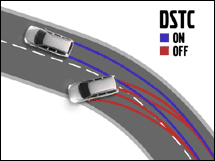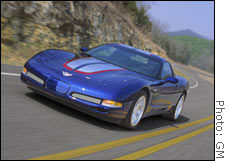NEW YORK (Money Magazine) -
You're cruising along, maybe too relaxed, and it happens: A patch of ice, an unexpected puddle, whatever, and the car fishtails. Your heart jumps to your throat, and now you're fighting the wheel, trying to avert a potentially deadly spinout.
What if there were a way to dramatically rewrite that scene? The vehicle hits the ice, a dashboard light flickers and, before you even have time to react, you're back on course and in full control. With an electronic stability-control (ESC) system, you can do exactly that -- avoid spinouts, prevent rollovers, save your neck and even your life.
 |
|
| A Volvo illustration showing the effect of Dynamic Traction/Stability Control, that company's version of ESC. |
SUV buyers, especially those who live in foul-weather climes, should consider stability control a must-have. But any driver, in any weather, in any type of car or truck, will be safer with this technology in his or her corner.
Here's why you need it and how it works. In a related story, we'll tell you how much it costs and who offers it.
Why you need it
From its first appearance in Mercedes, Cadillacs and Corvettes around 1997, stability control has shown great promise in preventing the skids, spins and rollovers that lead to thousands of injuries and deaths every year. But until recently, no hard data were available to prove it.
Now two studies from Europe and Japan -- where consumers have more widely embraced the systems -- confirm what I've long believed: that stability control may be second only to seat belts in safeguarding drivers and passengers.
 |
|
| Stabilitrak comes standard on the Chevrolet Corvette. SUVs need it even more. |
Toyota found that electronic stability control reduced single-vehicle crashes in Japan by a remarkable 35 percent and head-on crashes by 30 percent. And in the European study, Mercedes-Benz, whose lineup has sported ESC as a standard feature since 1999, reported a 29 percent drop in single-vehicle accidents; crashes of all types fell 15 percent.
Those kinds of results could prevent as many as 6,000 of the nearly 43,000 crash-related deaths each year in the U.S. -- dramatically more than air bags, which have saved about 800 lives annually since 1987, according to the National Highway Transportation Safety Administration (NHTSA).
How it works
In ESC systems, which evolved from anti-lock brakes, sensors monitor everything from steering-wheel position and tire speed to the centrifugal forces your vehicle undergoes while cornering. If the sensors detect that a driver is about to lose control, microprocessors automatically apply individual brakes and/or reduce engine power.
| ESC and more to come
|

|
|
|
|
Don't confuse ESC with primitive "traction control" systems, which can only stop wheels from spinning. ESC is vastly more sophisticated, able to correct your course with microchip speed and put you back in full control.
Don't expect the system to rewrite the laws of physics -- it won't let you make a turn at 80 mph that's designed for 35. But the technology works consistently and reliably. And unlike air bags, which minimize injuries only after the fact, ESC is pre-emptive -- an electronic guardian angel that steps in to avert potential disaster.
"The safest accident is one that doesn't happen," says Jim Khoury, manager of advanced development for General Motors, which offers its ESC system, Stabilitrak, on more than a dozen models.
A no-brainer for SUVs
A common misconception among SUV owners is that four-wheel drive covers all the safety bases in foul weather. The truth is, four-wheel drive boosts traction during a straight-line acceleration, but when you're turning or stopping, it does almost nothing to improve stability or safety.
That's why manufacturers and safety groups see ESC as the perfect prescription for SUVs, whose tippy stances and tricky handling in emergencies make them prone to rollovers, often with fatal results. More than 60 percent of all SUV deaths are caused by rollovers, compared with just 24 percent of deaths in passenger cars.
All told, rollovers account for just 3 percent of all accidents but nearly 25 percent of all crash fatalities, or roughly 11,000 deaths last year. And nine in 10 rollovers occur when a driver can't keep the vehicle on the road, exactly the situation in which ESC excels.
In the latest ESC development, SUVs from Ford and other automakers have added an extra sensor to recognize impending rollovers and deploy side-curtain air bags before the vehicle flips. Volvo's XC90, the first SUV from Ford's Swedish subsidiary, can actually pre-empt the rollover by braking individual wheels to keep the vehicle right-side up; ditto for Lincoln's Navigator and Aviator.
Leading safety advocates believe ESC systems will decrease the rollover risk posed by SUVs. Brian O'Neill, president of the Insurance Institute for Highway Safety, wants to see stability control become standard on all SUVs. Yet NHTSA, the federal agency that sets auto safety rules, has been more cautious.
The agency says that a shortage of real-world accident data, and the variety of ESC designs on the market, mean it's withholding judgment for now. It adds that a stability-control study is a top agency priority, with recommendations expected in the next two to three years. Meanwhile, the National Transportation Safety Board, a federal board acting in an advisory capacity, has strongly recommended that NHTSA require stability control on vehicles if its upcoming study proves ESC's benefit.
While cars roll over far less often than SUVs, they're not immune from sliding off a slick highway. It's telling that most sports cars, whose low centers of gravity, sticky tires and taut suspensions make them among the most sure-footed vehicles, rely on stability control for an extra margin of protection.

|

